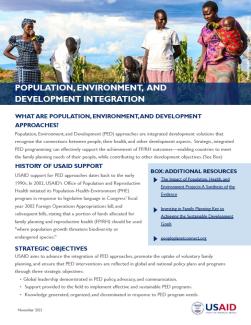An estimated 218 million women in low- and middle-income countries have an unmet need for modern contraception. Additionally, many communities that have the highest unmet need for family planning are in regions that are among the most vulnerable to the impacts of climate change.
Population, Environment, and Development (PED) approaches take a holistic and integrated approach to health and the environment, recognizing the connections between the health and well-being of both people and the environmental resources that they depend on. Integrating voluntary family planning and reproductive health (FP/RH) with initiatives that strengthen environmental sustainability can achieve health and environmental outcomes that are greater than from single-sector interventions alone.
USAID invests in PED approaches as part of an Agency-wide commitment to integrate climate considerations across all global initiatives, including in meeting the family planning and reproductive health needs of communities around the world. Integrating population and FP/RH with multiple sectors, including environmental management, democracy and governance, food security, and education, PED approaches help support the health, resilience, and security of both people and the environment.

